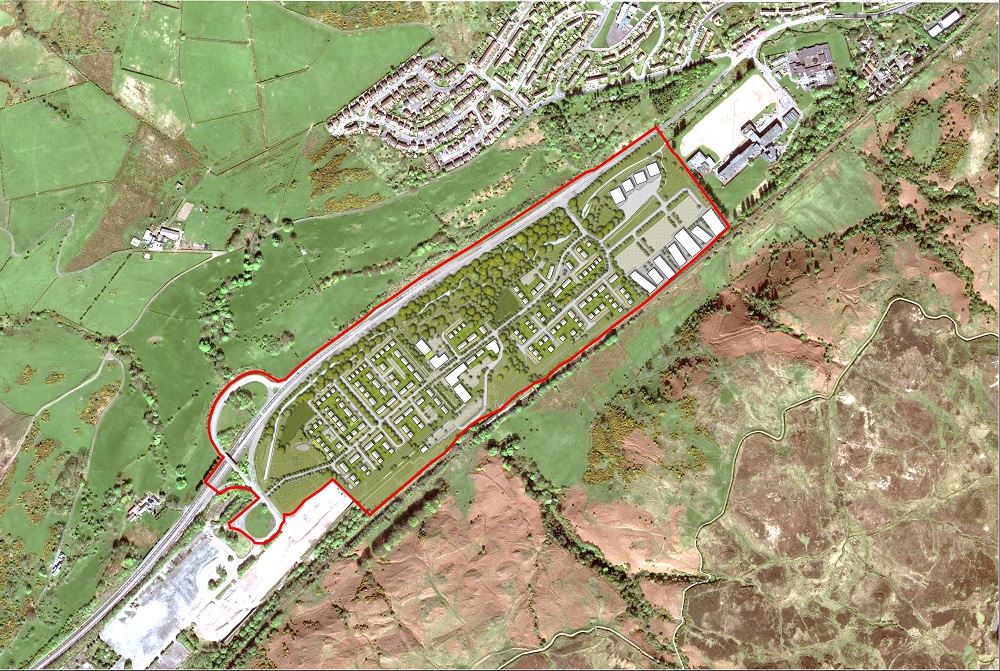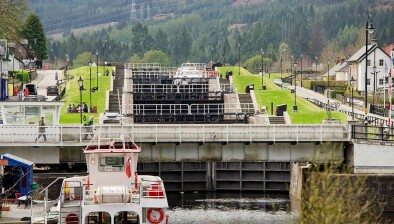Councillor suspended by Standards Commission over Spango Valley planning application

An Inverclyde councillor has been suspended for one month after he was found guilty of failing to declare an interest in a planning application for a major £350 million housing project at the former IBM Site in Spango Valley, Greenock.
Councillor Innes Nelson was found to have breached the Councillors’ Code of Conduct following a Standards Commission hearing at the Municipal Buildings yesterday.
A planning application for the development of 450 houses was considered by Inverclyde Council’s Planning Board at a meeting in March 2022.
Cllr Nelson – who resides at the nearby Chrisswell Farm - backed a recommendation to impose a 270-home cap on the number of properties which could be built on the site.
The Standards Commission Panel found that Cllr Nelson failed to declare an interest in the planning application and, instead, took part in the discussion and decision-making, despite the site that was the subject of the planning application being located near his property.
Ashleigh Dunn, Standards Commission member and chair of the Hearing Panel, said: “The Panel found that Cllr Nelson failed to declare an interest in the planning application and, instead, took part in the discussion and decision-making, despite the site that was the subject of the planning application being located near his property.”
The Panel noted that it was not in dispute that, at the Planning Board meeting in question, Cllr Nelson proposed that planning permission be granted subject to the conditions recommended by officers, as outlined in Inverclyde Council’s report (which restricted the number of houses to be erected on the site). He then voted in favour of granting the application, subject to the recommended conditions.
The Panel acknowledged that, while it was the nearest property to the proposed development, Cllr Nelson’s farmhouse was still some distance from it. The Panel further acknowledged that Cllr Nelson had supported the recommendation made by officers to grant the application at the meeting, albeit in an amended form with conditions on the number of properties to be built.
The Panel nevertheless considered that, having applied the objective test, as required by the Code, Cllr Nelson should have reached the view that his connection to the planning
application would reasonably be regarded as being so significant that it would be considered as being likely to affect his potential discussion and decision-making on the agenda item under consideration.
While the Panel noted that it did not have sufficient evidence before it to confirm whether the outcome of the decision on the matter would have had an impact, either positive or negative, on Cllr Nelson’s property, it nevertheless considered that given the proximity and the fact that it was an adjacent property separated only by the A78, a person with knowledge of these facts would reasonably consider that Cllr Nelson’s connection to the site of the development proposal would be sufficiently significant as to be likely to affect his discussion or decision-making.
The Panel agreed, therefore, that Cllr Nelson should have declared an interest, withdrawn from the meeting and taken no part in the discussion and decision-making on the matter.
In reaching its decision on sanction, the Hearing Panel noted that Cllr Nelson had co-operated fully with the investigative and Hearing processes, and had a previously unblemished record as a councillor. The Panel accepted that there was no evidence or suggestion that Cllr Nelson had tried to conceal his interest. The Panel was not satisfied that it had evidence before it that would lead it to conclude that Cllr Nelson’s interest had affected his discussion or decision-making as a member of the Planning Board, or that he had acted in anything other than good faith, when taking part in the decision-making.
The Panel agreed, however, that it was necessary to impose a suspension in order to reflect the seriousness of the breach, to promote adherence to the Code and to maintain and improve the public’s confidence that councillors will comply with the Code and will be held accountable if they fail to do so.
Ms Dunn noted: “The Panel emphasised that the requirement for councillors to declare interests is a fundamental requirement of the Code as it gives the public confidence that decisions are being made in the public interest, and not the personal interest of any councillor or their friends or family. A failure to comply with the Code’s requirements in this regard can erode confidence in the council and leave its decisions open to legal challenge.”
James & Sandy at the former IBM train station (Pic by Jeff Holmes)
Businessmen Sandy and James Easdale, who are behind the proposed development, have called on the councillor to resign.
The brothers said they were forced to lodge a “hugely time-consuming and costly appeal” against the council decision before permission was finally given to build 450 houses a year later.
Sandy Easdale said: “Cllr Nelson has been found guilty of breaching the code of conduct and must now resign as a councillor.
“It is beyond contempt that he put his own interests above those of his constituents regarding a planning application that sought to regenerate a landmark site in Inverclyde. He should have stepped back from the decision-making process but instead voted against the original planning proposal.
“Rather than attempt to hang onto office and the benefits he obtains from that, it is time for Cllr Nelson to finally do the decent thing and resign.”
James Easdale said: “The delay that Cllr Nelson created caused untold damage to the project. Not only have we personally encountered huge fees to appeal the original decision, the delay also coincided with a period where building costs and interest rates went through the roof.
“He had no thought for the families who might make the development their home or for those who would be employed during the build phase, including new apprentices.
“We are considering our options on whether to pursue Cllr Nelson on a personal basis for the costs incurred by his dreadful actions.”

















